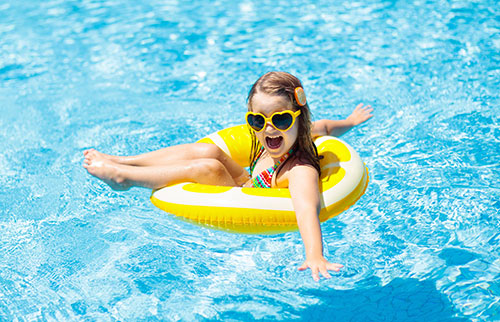Originally posted at Richmond.com
 Although it won’t officially be summer for another month, many Virginians already are facing some days of extremely hot weather. What follows are some recommendations on staying safe in the heat.
Although it won’t officially be summer for another month, many Virginians already are facing some days of extremely hot weather. What follows are some recommendations on staying safe in the heat.
Every year, more than 600 people in the U.S. die of heat-related illnesses, and many others experience hospitalization. It is crucial to ensure that we take precautions against heat injury.
Your body has several ways of getting rid of excess heat. The first is to release it into the air (or water) around you from your skin, and to dilate the blood vessels beneath your skin to carry more internal heat to the surface to be released.
The second occurs through breathing, where body-temperature air is exhaled and replaced by cooler inhaled air. The third — and perhaps most important — is through sweating. Water in sweat evaporates, taking heat with it and cooling the skin.
When the body can’t shed enough heat, its core temperature starts to rise, and serious danger can follow. Heat cramps might occur, where muscle pain develops, often after overexertion in the heat. Heat exhaustion might follow, with excessive sweating; cool, clammy skin; extreme fatigue; headache; muscle cramps; nausea or vomiting; dizziness or lightheadedness; confusion; and darker-colored or decreased urination.
Heat stroke is the most serious outcome, where the body’s cooling systems have been overwhelmed. The body temperature rises to 105 degrees Fahrenheit or higher; the skin becomes warm and dry; and rapid heart rate, shallow breathing and significant mental status changes occur. This might lead to permanent brain and organ injury, coma and death.
Extreme heat is especially dangerous in humid climates. As the air temperature approaches body temperature, it becomes harder for the skin or breath to release body heat. In high humidity, sweat evaporates very slowly, losing much of its cooling effect.
Dehydration occurs as body fluid is lost through sweating and evaporation. In turn, dehydration makes it harder to sweat, and increases risk of organ damage due to loss of blood flow.
The best way to avoid heat injury is prevention. Here are few tips from an old soldier, who now is your state health commissioner:
- Be aware of the weather forecast for any given summer day, and plan ahead. (P.S. This is good advice all year round.)
- For particularly hot, humid days, limit outdoor activity. Stay in an air-conditioned location as much as possible, and if you will be outdoors, frequently seek shade. Wear light-colored clothing and wide-brimmed hats to reflect the sun’s rays. Apply sunscreen to exposed skin.
- Limit or postpone outdoor exertion. The hotter it gets, the more time resting (in shade) you need and the less time you should spend working. Play, such as sports or hiking, counts just as much as work.
- Hydrate, hydrate, hydrate. If you will be outdoors, plan on drinking a quart of fluid every hour or so. Alternating water with a sports-type drink often works best. Skip the caffeine and alcohol: Both of these increase urination and dehydration.
Don’t wait to feel thirsty.
- Drink fluids on a schedule when you’re outdoors in the heat.
- Don’t skip meals, especially breakfast. There is water in your food as well as in your drink.
- Have a buddy, and watch out for each other while in the heat. Include weather in your work planning.
- Be a buddy, especially to elderly or disadvantaged neighbors, who might not have air conditioning. Check up on them; offer them access to AC during the heat. Homeless people are especially at risk.
- Never leave children or animals alone in vehicles.
For mild symptoms, in yourself or your buddy:
- Get out of the heat, into an air-conditioned space if possible, but into the shade as a minimum.
- Rest in a cool area until symptoms completely resolve.
- Drink water or sports drinks, as discussed above.
- Consider calling it quits for the day for any more outdoor exertion.
For any concern of heat stroke (changes in level of consciousness; disorientation or confusion; warm, dry skin without sweating despite the heat):
- Dial 911 immediately.
- Cool the victim down as effectively as possible: move to shade/indoors, wet down with water and fan the body.
- Only give fluids by mouth if fully conscious and oriented.
- Get to medical attention as soon as physically possible.
Heat is part of summer — and sometimes late spring — but it can be dangerous if not treated with respect. Let’s prevent heat injuries in our commonwealth.
